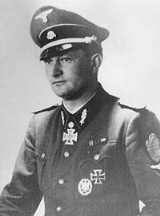
Karl Ullrich
Encyclopedia
Karl Adolf Ullrich was an Oberführer
(Senior Colonel) in the Waffen-SS
, who was awarded the Knight's Cross with Oakleaves
during World War II
.
He was commissioned as an officer within a year and posted to command the 3rd Company, SS Pionier Battalion, SS-Verfügungstruppe
.
1st and 2nd class for bravery during the Battle of France
, then transferred to the Totenkopf on the Eastern Front
in 1941.
He was awarded the Knight's Cross for his leadership and bravery during the battles of the Demyansk pocket
in February 1942 and in October 1944 was given command of the 6th SS Panzer Grenadier Regiment Theodor Eicke and was awarded the Oakleaves while in command.
Promoted to Standartenführer (Colonel) he was given command of the 5th SS Panzer Division Wiking
for the final battles of the war in Hungary
. A short time before the end of the war he was promoted to Oberführer and he surrendered to the Russians in May 1945.
Oberführer
Oberführer was an early paramilitary rank of the Nazi Party dating back to 1921. Translated as “Senior Leader”, an Oberführer was typically a Nazi Party member in charge of a group of paramilitary units in a particular geographical region...
(Senior Colonel) in the Waffen-SS
Waffen-SS
The Waffen-SS was a multi-ethnic and multi-national military force of the Third Reich. It constituted the armed wing of the Schutzstaffel or SS, an organ of the Nazi Party. The Waffen-SS saw action throughout World War II and grew from three regiments to over 38 divisions, and served alongside...
, who was awarded the Knight's Cross with Oakleaves
Knight's Cross
Knight's Cross refers to a distinguishing grade or level of various orders that denotes bravery and leadership on the battlefield....
during World War II
World War II
World War II, or the Second World War , was a global conflict lasting from 1939 to 1945, involving most of the world's nations—including all of the great powers—eventually forming two opposing military alliances: the Allies and the Axis...
.
Early life
Ullrich was born in Saargemünd in 1910, joined Infantierie-Regiment 19 after having graduated from university. He went from there to the SS-Verfügungstruppe (later the Waffen-SS). Ullrich was an engineering graduate when he joined the SS Engineer Battalion of the SS-VT 1934.He was commissioned as an officer within a year and posted to command the 3rd Company, SS Pionier Battalion, SS-Verfügungstruppe
SS-Verfügungstruppe
The SS-Verfügungstruppe was formed in 1934 as combat troops for the NSDAP. By 1940 these military SS units had become the nucleus of the Waffen-SS....
.
WWII
He was awarded the Iron CrossIron Cross
The Iron Cross is a cross symbol typically in black with a white or silver outline that originated after 1219 when the Kingdom of Jerusalem granted the Teutonic Order the right to combine the Teutonic Black Cross placed above a silver Cross of Jerusalem....
1st and 2nd class for bravery during the Battle of France
Battle of France
In the Second World War, the Battle of France was the German invasion of France and the Low Countries, beginning on 10 May 1940, which ended the Phoney War. The battle consisted of two main operations. In the first, Fall Gelb , German armoured units pushed through the Ardennes, to cut off and...
, then transferred to the Totenkopf on the Eastern Front
Eastern Front (World War II)
The Eastern Front of World War II was a theatre of World War II between the European Axis powers and co-belligerent Finland against the Soviet Union, Poland, and some other Allies which encompassed Northern, Southern and Eastern Europe from 22 June 1941 to 9 May 1945...
in 1941.
He was awarded the Knight's Cross for his leadership and bravery during the battles of the Demyansk pocket
Demyansk Pocket
The Demyansk Pocket was the name given for the encirclement of German troops by the Red Army around Demyansk , south of Leningrad, during World War II on the Eastern Front. The pocket existed mainly from 8 February-21 April 1942. A much smaller pocket was simultaneously surrounded in Kholm, about ...
in February 1942 and in October 1944 was given command of the 6th SS Panzer Grenadier Regiment Theodor Eicke and was awarded the Oakleaves while in command.
Promoted to Standartenführer (Colonel) he was given command of the 5th SS Panzer Division Wiking
5th SS Panzer Division Wiking
The 5th SS Panzer Division Wiking was one of the elite Panzer divisions of the thirty eight Waffen SS divisions. It was recruited from foreign volunteers, from Scandinavia, Finland, Estonia, The Netherlands, and Belgium under the command of German officers...
for the final battles of the war in Hungary
Hungary
Hungary , officially the Republic of Hungary , is a landlocked country in Central Europe. It is situated in the Carpathian Basin and is bordered by Slovakia to the north, Ukraine and Romania to the east, Serbia and Croatia to the south, Slovenia to the southwest and Austria to the west. The...
. A short time before the end of the war he was promoted to Oberführer and he surrendered to the Russians in May 1945.

